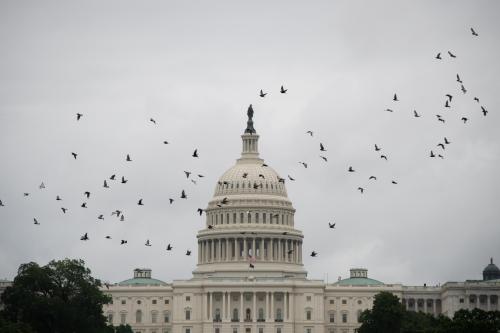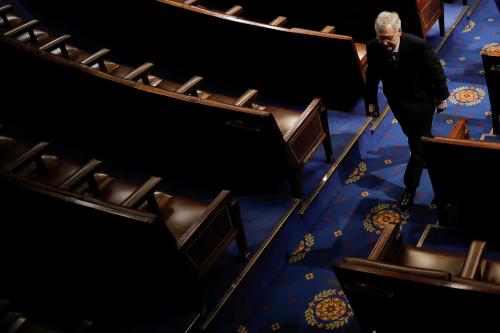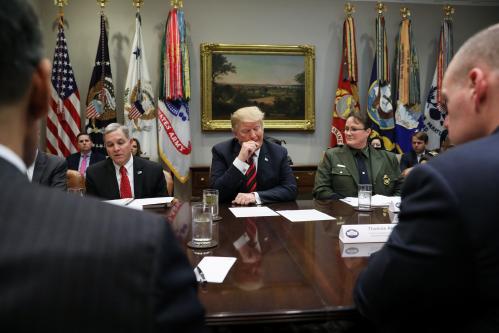Senator Lisa Murkowski (AK) has joined three other Republican Senators—Thom Tillis (NC), Susan Collins (ME), and Cory Gardner (CO)—to call for an end to the ongoing partial shutdown. These party defections illustrate that the longer Trump lets the shutdown go on, the more dangerous it gets for him. Once there are a total of 20 Republicans willing to vote with Democrats, they can override Trump’s threatened veto of the spending bill and the government will reopen. In other words, four down; 16 to go.
Such an outcome is not out of the question. Trump has been embarrassed by his party in the Senate before—remember the failed vote to repeal Obamacare? But this president seems unfazed by ordinary embarrassment and cares only about pleasing his base, not putting together majorities. What the president may not realize, however—and what makes a vote like this especially hazardous for him—is that 67 votes in the Senate is the same number that would be needed to convict him should the House, pending one or more bombshells in the Mueller report, decide to vote on articles of impeachment.
Can we imagine 20 Republicans deciding to abandon their party’s controversial and chaotic leader? It’s not as difficult as conventional wisdom would have you believe. Start by considering the 22 Republican senators who will be up for re-election in 2020. Trump lost two of those states (Maine and Colorado) and those two Senators have already jumped ship. There are another three states up in 2020 that Trump won by 5 points or less: Arizona, Georgia and North Carolina. Presidential races draw many more young people into the electorate, and young voters have not been enthusiastic about the Republican party or Donald Trump lately. So, some Republican Senators from these states may find it in their political interest to put some distance between themselves and their president.
Or, instead of looking at the senators up for re-election in 2020, one can look at the senators who just won re-election in 2018. A major reason for a Republican elected official to stick with Trump is fear of being “primaried” by one of the president’s hard-core supporters. But six years is a lifetime in politics. Senators who have just been re-elected have a long time to mend fences and fight off a primary challenge from the base, thus allowing them to move away from the president if they so wish.
In addition to the cold electoral calculations, personal grudges and resentments likely linger. One sure sign that Trump is not a politician is the enthusiasm with which he makes enemies and the reluctance with which he makes friends. Trump has a rather remarkable record of attacking senators in his own party. Remember his put down of Senator Marco Rubio (R-Fla.)—“little Marco”—or his attacks on Senator Ted Cruz’s (R-Texas) wife and father. In his first summer in office, he engaged in a feud with Senate Majority Leader Mitch McConnell (R-Ky.). High-profile Republicans have moved on from Trump’s insults in order to preserve party unity, but that trend is not guaranteed to continue.
Moving beyond cold political calculations and personal antipathy, one would hope that there are senators who will prioritize concerns for the United States’ position in the world. And in fact, there is evidence that this is the case. Modern American presidents are generally accorded a wide range of authority in foreign policy. But Republican senators have been openly critical of their president on a whole range of foreign policy issues—from Russian sanctions, to Trump’s summit with Putin, to his excusing the Saudi leadership’s alleged involvement in murder, to his precipitous withdrawal of forces around the world.
And last, but not least, is the newly elected Senator Mitt Romney (R-Utah). As a former Republican nominee for president, he commands a national audience. He marked his arrival in Washington with an op-ed piece openly critical of Trump, and he seems ready to take up the space left by Senator John McCain’s (R-Ariz.) death. Although he got some blowback from his fellow Republicans, it’s not hard to see him working the cloak room and garnering support for his own agenda—one that may not align with the president’s interests.
So, as the government shutdown continues, watch the Republican senators for cracks in their unity. They may have significant consequences down the road. Impeachment and conviction are in the hands of twenty Republican Senators. Democrats know that impeaching Donald Trump without Republican support is folly.









Commentary
Trump’s shutdown could wear out his welcome in the Senate once and for all
January 9, 2019